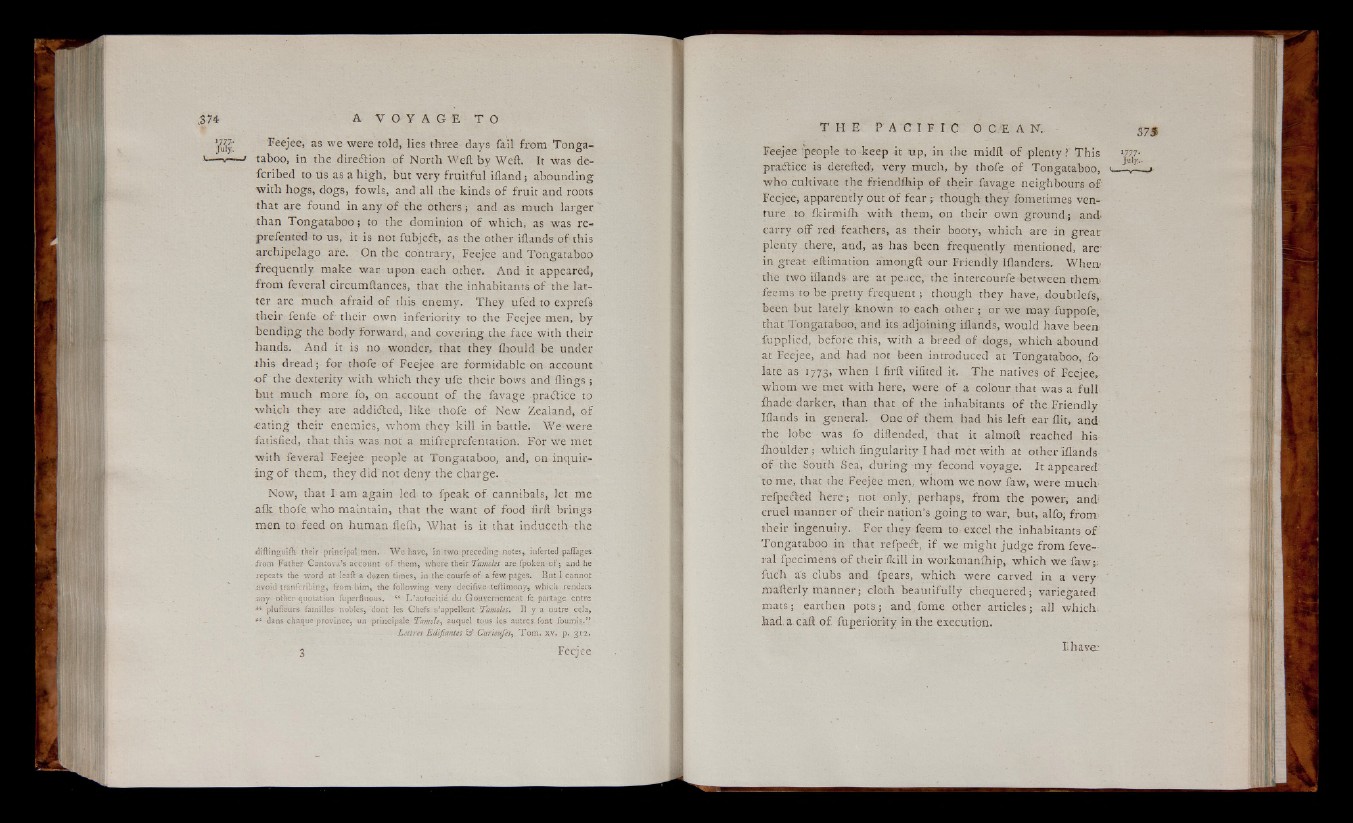
ju7iy.’ Feejee, as we were told, lies three days fail from Tonga-
taboo, in the diredtion of North Weft by Weft. It was de-
fcribed to us as a high, but very fruitful ifland j abounding
with hogs, dogs, fowls, and all the kinds of fruit and roots
that are found in any of the others; and as much larger
than Tongataboo; to the dominion of which, as was re-
prefented to us, it is not fubjedf, as the other iflands of this
archipelago are. On the contrary, Feejee and Tongataboo
frequently make war upon each other. And it appeared,
from feveral circumftances, that the inhabitants of the latter
are much afraid of this enemy. They ufed to exprefs
their fenfe of their own inferiority to the Feejee men, by
bending the body forward, and covering the face with their
hands. And it is no wonder, that they fhould be under
this dread; for thofe of Feejee are formidable on account
•of the dexterity with which they ufe their bows and flings ;
hut much more fo, o.n account of the favage pra£tice to
which they are addifled, like thofe of New Zealand, of
eating their enemies, whom they kill in battle. We were
fatisfied, that this was not a mifreprefentation. For we met
with feveral Feejee people at Tongataboo, and, on inquiring
o f them, they did'not deny the charge.
Now, that I am again led to fpeak of cannibals, let me
aik thofe who maintain, that the want of food firft brings
men to feed on human flefh, What is it that induceth the
sdiftinguifh- their principal men. W e have, in two preceding notes, inferted paflages.
from Father Cantova’s account of them, where their 'Tamoles are fpoken of ; and he
repeats-the word at-leaft a dozen times* in the courfe of a few/pages. But I cannot
avoid tranfcribing* from him, the following veny deciiiv-e teftimony, which renders
.any other quotation fuperfluous. “ L ’autoritie du Go'uyernement fe partage entre
plufieurs families nobles, 'doht les Chefs s’appellent Tamoles. 11 y a outre iffe j
dans chaque province, un principale Tamole, auquel tous les autrqs font foumis.”
Lettres Edifiantes & Curieufes, Tom. xv. p. 312.
3 Feejee
Feejee people to keep it up, in the midft of plenty ? This 'W-
practice is detefted, very much, by thofe of Tongataboo, 1 ■
who cultivate the friendfhip of their favage neighbours of
Feejee, apparently out of fear; though they fometimes venture
to Ikirmiih with them, on their own ground; and
carry off red feathers, as their booty, which are in great
plenty there, and, as has been frequently mentioned, are’
in great -eftimation amongft our Friendly Iilanders. When-
the two iflands are at peace, the intercdurfe between therm
feems to be pretty frequent; though they have, doubtlefs;
been but lately known to each other ; or we may fuppofe;
that Tongataboo, and its adjoining iflands, would have beerr
fupplied, before this, with a breed of dogs, which abound
at Feejee, and had not been introduced at Tongataboo, folate’
as r773, when I firft vifited it. The natives of Feejee,
whom we met with here, were of a colour that was a full
fhade darker, than that of the inhabitants of the Friendly
Iflands in general. One of them had his left ear flit, and
the -lobe was fo diftended, that it almoft reached his-
fhoulder; which Angularity I had met with at other iflands- -
of the South Sea, during my fecond voyage; It appeared
to me, that the,Feejee men, whom we now faw, were much
refpecfted here ; not only, perhaps, from the power, and
cruel manner o f their nation's going to war, bur, alfo, from
their ingenuity. For they feem to excel the inhabitants o f
Tongataboo in that refpeft, if we might judge from feve—
ral fpccimens of their ikill in workmanihip, which we faw;;
fuch as clubs and fpears, which were carved in a very
mafterly manner; cloth beautifully chequered; variegated
mats; earthen pots; and fome other articles; all which,
had, a call of fuperiority in the execution.
Fhave: